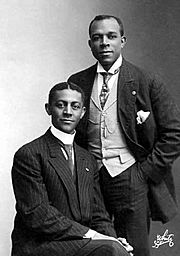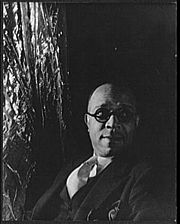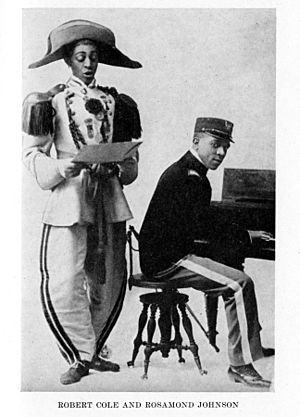J. Rosamond Johnson facts for kids
J. Rosamond Johnson (born August 11, 1873 – died November 11, 1954) was an American composer and singer. He was an important figure during the Harlem Renaissance, a time when Black art and culture thrived. Born in Jacksonville, Florida, he spent much of his career in New York City. Johnson is best known for composing the music for the hymn "Lift Every Voice and Sing". This powerful song was first performed in 1900 by 500 Black American students in Jacksonville, Florida.


J. Rosamond Johnson was the younger brother of the famous poet and activist James Weldon Johnson. James Weldon Johnson wrote the words for "Lift Every Voice and Sing." The brothers also worked together on important causes with the NAACP.
Contents
Early Life and Education
J. Rosamond Johnson was born on August 11, 1873. His mother, Helen Louise Dillet, was from Nassau, Bahamas. His great-grandmother had escaped from Haiti in 1802 during a revolution. Her family settled in the Bahamas. Johnson's grandfather, Stephen Dillet, became the first man of color elected to the Bahamian legislature in 1833.
Johnson studied music at the New England Conservatory of Music in the United States. He also continued his music studies in London. He began his career as a public school teacher in his hometown of Jacksonville, Florida.
A Career in Show Business
Johnson later moved to New York to start his show business career. He teamed up with his brother, James Weldon Johnson, and composer Bob Cole. Together, they became a successful songwriting team. They wrote many works, including The Evolution of Ragtime in 1903.
The group also created two popular Broadway shows called operettas. These shows featured Black actors. They were Shoo-Fly Regiment in 1906 and The Red Moon in 1908. Johnson also acted in these operettas. In The Red Moon, he played Plunk Green. His character had a love scene with Minnehaha, played by Abbie Mitchell. Minnehaha was a mixed Indian and Black woman. This was a big step for the time, as it showed different races on stage together. Johnson was even made a 'sub-chief' by the Iroquois tribe in Montreal because of this show.
Johnson and his partners also created musicals for white audiences. These included Sleeping Beauty and the Beast (1901), In Newport (1904), and Humpty Dumpty (1904). Later, Johnson worked with J. Leubrie Hill on Hello Paris in 1911.
Other Musical Roles
After Bob Cole passed away in 1911, Johnson continued to perform. He toured the vaudeville circuit, which featured many different acts. He also toured with Charles Hart and Tom Brown. From 1912 to 1913, he worked in London writing music for a theater review.
When he returned to the United States, Johnson became the director of the Music School Settlement for Colored in New York. He held this position from 1914 to 1919. In 1917, he served as the first Deputy Marshal for the historic Negro Silent Protest Parade. This was a march for civil rights.
Johnson also toured with his own music groups, like The Harlem Rounders. He performed in concerts featuring Negro spirituals with Emmanuel Taylor Gordon.
In the 1930s, Johnson was the musical director for the London show Blackbirds of 1936. He also sang the role of Frazier in the first production of George Gershwin's famous opera, Porgy and Bess. He sang this role again in a 1951 recording of the opera.
Collecting African-American Songs
J. Rosamond Johnson was also important for collecting and preserving traditional African-American songs. He edited four important collections. The first two, The Book of American Negro Spirituals (1925) and The Second Book of Negro Spirituals (1926), he put together with his brother James. He also edited Shoutsongs (1936) and Rolling Along in Song (1937).
J. Rosamond Johnson passed away on November 11, 1954, in New York City.
Musical Works
- The Shoo-Fly Regiment (1906), a Broadway operetta
- The Red Moon (1908), a Broadway operetta
- The Sleeping Beauty and the Beast (1901), a musical
- "My Castle On The Nile," song (1901)
- "My heart's desiah is Miss Mariah" (1901), song
- "Mudder Knows" (1903), song
- In Newport (1904), a musical
- Humpty Dumpty (1904), a musical
- "I'll Keep a Warm Spot in My Heart For You" (1906), song
- Mr. Lode of Koal (1909), a musical
- Come Over Here (1912), a musical
- "The Maiden with the Dreamy Eyes,", song
- "Didn't He Ramble", song
- "Li'l Gal", song
- "Since You Went Away", song
- "Lift Every Voice and Sing", song
- "The Siberian Dip" (1911), a ragtime instrumental
See also
- The Frogs (club)
- African American musical theater
 | Kyle Baker |
 | Joseph Yoakum |
 | Laura Wheeler Waring |
 | Henry Ossawa Tanner |


